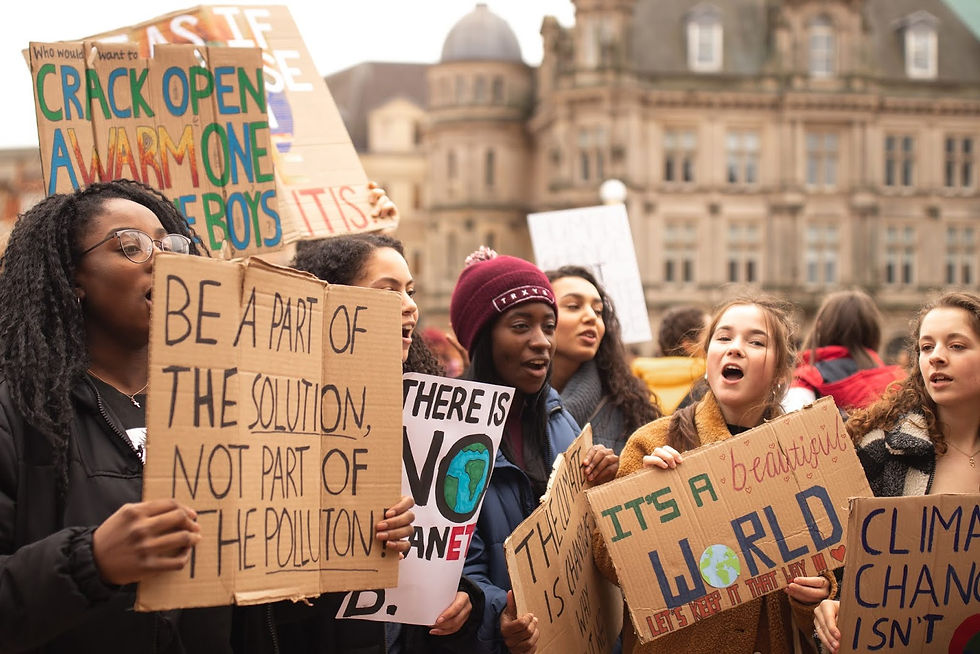Environmental Racism: Why We Should All Care and How Youth Can Make a Difference
- Dorothy Sierra-Gutierrez
- Jul 17, 2024
- 3 min read
Updated: Nov 18, 2024

Environmental racism is a big problem that hits marginalized communities the hardest. It means that Black, Indigenous, and low-income communities often face the brunt of environmental hazards. Think about it: these neighborhoods are more likely to be near landfills, in industrial plants, and other pollution sources. This leads to serious health issues, lower quality of life, and limited access to clean air, water, and green spaces.
Follow the story of Louise Delisle who experienced environmental racism in Shelburne, Nova Scotia. Delisle, a long-time resident of Shelburne, grew up near a town dump that operated for over 70 years. This dump, located in a predominantly Black community, received various waste products, including heavy metals and other hazardous materials. Over the years, Delisle witnessed the devastating impact of the dump on her community, with many residents, including her own family members, suffering from high rates of cancer and respiratory illnesses. The toxic environment led to significant health issues and loss, making it clear that the community was disproportionately affected by the town's waste management practices.

Delisle’s story gained broader recognition through the documentary "There's Something in the Water," co-produced by actress Ellen Page and sociologist Ingrid Waldron. The documentary, based on Waldron's book, sheds light on the struggles of Black and Indigenous communities in Nova Scotia against environmental hazards imposed upon them. Delisle’s story in the film reveals the daily realities of living in a polluted environment and the long-term health consequences faced by her community. By sharing her experiences, Delisle hopes to raise awareness and advocate for change, ensuring that future generations do not endure the same injustices. Her participation in the documentary and the subsequent screening at the Toronto International Film Festival (TIFF) provided a platform to amplify her voice and bring much-needed attention to the issue of environmental racism in Canada.
In Canada, there's a growing movement to tackle environmental racism, especially with the potential passage of Bill C-230. This bill would require the government to gather data on environmental hazards areas and the impact on different races, socioeconomic statuses, and health outcomes. This is crucial because, right now, race often determines who gets access to clean resources and who doesn't. If we don't act, these hazards will keep hitting Indigenous, Black and other marginalized communities the hardest. According to Global News, Black communities were disproportionally affected by COVID-19, in Canada. Many individuals in these communities work essential jobs and live in crowded areas, which makes it easier for the virus to spread. In places like northwest Toronto, where many Black and Brown people live, COVID-19 positivity rates were high because lots of residents had to take public transportation and work multiple jobs to make ends meet.
In a post-pandemic world, it's critically important for decision-makers to acknowledge climate impacts and environmental racism actively affect the way Indigenous and Black communities access health resources. By ensuring everyone has access to healthcare, equal health opportunities, and quality care, we can build a fairer system that helps all communities stand strong against climate change.

So, why should youth care? Because young people have the power to drive change! Getting involved in climate initiatives, especially for Black youth, can push for policies that address these deep-rooted issues. Youth can advocate for environmental racism in Canada by getting involved in local community groups and environmental organizations, using social media to raise awareness, and pushing for legislative changes like Bill C-230. FBF strives to inspire youth to begin educating themselves about cases like Shelbourne, Nova Scotia or understanding how COVID-19 impacted Black communities. By staying informed, spreading the word, and acting, youth can drive environmental justice forward.
Let's make it our mission to support and engage in efforts to correct the environmental racism and climate change that impacts our communities. Join the movement, get involved, and be the change we need!
To Learn More Visit:




Comments